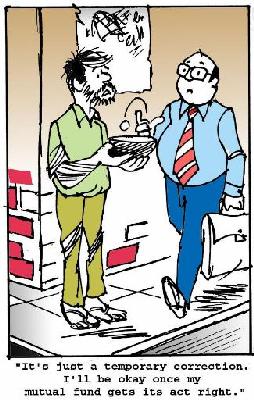 Before we jump into a conclusion, we should examine how’s Mutual Fund (known as Unit Trust in English Commonwealth countries) works.
Before we jump into a conclusion, we should examine how’s Mutual Fund (known as Unit Trust in English Commonwealth countries) works.Promoters and salesmen for the mutual funds are very friendly, some even hire only pretty ladies or handsome guys to lure the investors. This is not a bad thing since every one likes beautiful things and people. Everyone likes to be pleased. Remember when you shop in the jewelry shop, whatever you choose, you will be praised by the salesmen that your taste is very unique – that gives you an impression that you are the only one in the world, you are superior. Because of the feeling, it is naturally that you would pour out money to buy the jewelry. Whether the praise mentioned by the salesmen is truth or not is not important. After all, what lies in the salesmen mind is to sell you out the jewelry and earn the commission.

Business is business and for sure there is no free lunch in this world. Everything incurs cost. By setting up a fancy sales booth, hiring friendly yet pretty sales people, or even drives directly to your house or office to promote his funds all incurs cost, being it directly or indirectly. People naïvely think that it does not cost him single cent are doomed to be manipulated. While it is legal and makes sense that business needs to earn in order to sustain its operation, it is VITALLY important that the place you invest should at least protect your asset value for the first place and then enhancing its value for the later part. If the investment you made could not meet its first role of protecting its value, not mentioning of enhancing its value, it is worthwhile thinking of whether you make a sound investment or not. The case is worse if the investment you made not only does not protect its original value but bring you a negative value.
The problem lies in the mutual fund industry is its management fee is based on Asset Based Commission (ABC). That means no matter what’s the performance of the fund, being it good or bad, it will deduct 1.5% of the ENTIRE NET ASSET VALUE (NAV) of the fund. Put it an example, say Fund JKL NAV is $1 billion. Thus, at the end of the year, the fund manager will deduct 1.5% of NAV, that’s $15 million from the fund as management fee. Whether the fund performance is positive or negative is not the prime consideration. It is no wonder fund managers are looking for the biggest fund – the bigger the fund, the more they earn. This problem happens in almost every industry where the managers manage Others People Money (OPM) and this scenario is known as Owner-Agency Conflict.
How to prevent us from falling prey into this Owner-Agency Conflict? First of all, ask yourself what’s the objective of the investment you made? To please someone? Cannot resist because of pretty ladies or handsome guys persuasion? Or to create value to your asset? If the answer is the latter, then you need to choose carefully your fund manager. He should be the one whose his management fee should be Performance Based Commission (PBC) rather than Asset Based Commission (ABC). If his performance is poor, there is no reason he still receiving a handsome pay check. On the other hand, if he delivers, we should share some of our profits with him. Doesn’t it fairer?
Technorati Tags: Investment, Mutual Fund, Unit Trust, Asset Based Commission, Performance Based Commission, Net Asset Value, NAV, OPM, Owner-Agency Conflict
No comments:
Post a Comment